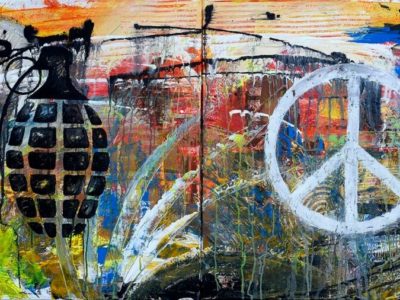For everyone who wished on birthday candles or shooting stars for world peace, there’s hope for you yet. The Peace and Conflict Studies major calls to anyone who wants to understand the causes, impacts and solutions to war. It is a multidisciplinary area of study that calls on the “obvious” fields of history, politics, economics and culture. Beyond that, this major delves into topics like psychology, sociology, religion and biology. In other words? This major guides today’s students, who will stand as tomorrow’s leaders.
What You’ll Be Doing
Introductory courses cover the complex definition of global conflict, how to resolve it and the shortcomings of those plans. Students will also need to take communications classes to learn how to prompt conversation between two groups at war. If students decide to study a specific part of the world, specific history and religion courses will help ensure they understand and respect that region’s culture.
The Classes You’ll Take
Intro courses teach the concepts of peace and conflict resolution, theories of the causes of conflict and applications of solutions in different global contexts. To better understand these ideas, students also have to take a course on global politics. There, they’ll learn about the behaviors and interactions of different international actors and organizations. Another course consistent across curriculums includes one in cross-cultural communication. In this, students examine the impact of culture on the behaviors of different societies to understand how they function.
Internships for this Major
Internships for Peace and Conflict Studies range from helping at a local, non-profit organization to working at the Department of Homeland Security. For instance, students will find opportunities at international organizations aimed at improving global relations and quality of life, such as the United Nations or Amnesty International. Others might intern “abroad” while at home by working for embassies or different social justice groups with international offices. Even cooler? Some lucky students may even work with local representatives and senators or on White House councils to influence policy abroad.
Career Opportunities
1. Legislative Aide
Legislative aids equal assistants that staff the offices of senators and representatives. They’ll need good management, communication and research skills to work with their representatives, other assistants and any constituents they may need to contact for a certain bill.
2. Human Rights Officer
Human rights officers focus on addressing human rights violations around the world. They perform tasks such as documenting violations and creating interventions for them. Besides that, they’ll often work for nonprofit and government organizations such as the United Nations and Amnesty International. Because of that, human rights officers frequently work abroad, where they’ll experience conflicts or disasters.
3. Public Advocate
Public advocates serve as “watchdogs” to make sure citizens have a voice in shaping their government and its policies. They also investigate complaints with different services. In addition, when working abroad they ensure that international policies transpire. Public advocates must know how different governments function, and how to handle issues with respect to state-issued services.
4. Program Coordinator
Program coordinators oversee the functioning of any assistance or relief efforts. They will often direct fundraising efforts, outreach and distribution of assistance. Peace and Conflict Studies majors can work for any number of nonprofit and/or government organizations in any field. For instance, a student interested in women’s rights in Africa could oversee efforts to teach girls self-defense techniques to help them feel safe.
5. Journalist
Yes, you won’t necessarily need to major in journalism for this. Peace and Conflict Studies journalists may work as war correspondents, newsagents or those exposing the realities of a conflict.
Reviews
1. “The topics of my classes were ones that I already felt very passionate about outside of the context of my studies, but I think that another big reason why I found them so compelling was that they were so multifaceted in the range of views they presented and the range of approaches they took to learning. The more creative and hands-on elements of my classes in particular have really stuck with me outside of the context of school and work. Getting to connect with activists in these classes introduced me to ways to be involved outside of school and work, and at any age, and gave me a model of how to be involved after college as well.” – Rachel Vogel, Swarthmore University, Class of 2016
2. “Conflict Studies taught me to be an informed citizen, to question what I am being told and to put myself into other peoples shoes. Conflict Studies gave me the tools to work with people from all walks of life and most importantly it taught me to be an advocate for the underprivileged. Every conflict is multi-faceted. There is no one-shoe-fits all approach to resolution. Conflict studies gave me the tools to recognize the conflict, evaluate the various elements and work to resolve the conflict without causing damage.” – Carlie Vaughn, Class of 2016, DePauw University
3. “My experience with the program has solidified my interest in pursuing a career in counterterrorism while also giving me an incredible resume boost and networking opportunities. The program is still relatively new, but I have still learned an incredible amount from professors who have all held positions in various letter agencies or who have served our country.” – Brittni Fine, University of Maryland, Class of 2017



















